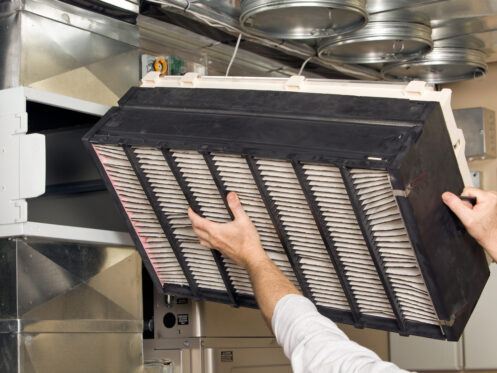We spend a significant amount of time in our homes, breathing the air circulating within its walls. But have you ever stopped to think about what’s in the air you breathe? A cozy evening indoors could easily be filled with unseen pollutants and allergens. Your family’s health can be affected in subtle ways by the quality of air within your living space. Recognizing the culprits behind poor indoor air quality is the first step to creating a healthier environment for you and your loved ones.
1. Old and Outdated HVAC System
One of the factors that affects home air quality the most is an old and outdated HVAC system. These aging systems are not only less efficient but are also prone to releasing pollutants into the air. Dust, mold and even harmful gases, like carbon monoxide, can be circulated throughout your home by a deteriorating HVAC system. The older the system, the less effective it is at filtering and purifying the air, which can result in a host of health problems, including respiratory issues, allergies and even more severe conditions in extreme cases.
Upgrading your cooling and heating systems to more energy-efficient solutions is a highly effective way to minimize these pollutants and dramatically improve the air quality in your home. John Henry's Plumbing, Heating, Air, and Electrical specializes in evaluating your current HVAC systems and recommending upgrades that are more efficient and environmentally friendly. Consulting with us ensures that you’re investing in a long-term solution that will contribute to a healthier, more comfortable living environment.
2. Poor Ventilation
Poor ventilation in a home can lead to a buildup of indoor air pollutants, such as dust, pet dander and volatile organic compounds. The accumulation of these pollutants compromises indoor air quality, affecting the health and comfort of those residing in the home. Notably, poor ventilation can exacerbate preexisting health conditions, like asthma, allergies and other respiratory issues. Even in the absence of these conditions, a lack of fresh air circulation can lead to fatigue, headaches and general discomfort.
In many cases, resolving poor ventilation requires the expertise of professionals in the HVAC industry. These experts can evaluate the air circulation in your home, identify areas that need improvement and recommend appropriate, effective solutions. This could involve upgrading your HVAC system, installing new air exchange units or even optimizing the layout of your home’s air vents and ducts. Getting a proper assessment is crucial to ensure that any changes made will genuinely improve indoor air quality.
3. Presence of Mold and Mildew
Mold and mildew are notorious for negatively impacting indoor air quality, thriving in areas of high humidity, such as basements, bathrooms and kitchens. They can contribute to various health issues, including respiratory problems, allergies and skin irritations. Beyond health implications, mold and mildew also produce an unpleasant, musty smell that can permeate your home, making it uncomfortable to live there.
In addressing a mold or mildew problem, using a dehumidifier is often recommended alongside professional services, like those offered by John Henry's Plumbing, Heating, Air, and Electrical. A dehumidifier can help regulate the moisture levels in your home, making it less hospitable for mold and mildew growth. While a dehumidifier can help in prevention and maintenance, it’s essential to consult professionals for a thorough inspection and remediation plan to effectively tackle the issue and improve your home’s air quality.
4. Household Cleaning Products
Household cleaning products often contain volatile organic compounds (VOCs), which are released into the air during use. These VOCs can negatively impact indoor air quality, leading to issues, ranging from eye and respiratory irritation to more serious long-term health effects involving the liver, kidneys and central nervous system. While these products may make your surfaces shine, they can degrade the quality of air you and your family breathe indoors.
Transitioning to low-VOC or VOC-free cleaning products is advisable to improve your home’s air quality. However, with so many products on the market, knowing which ones are truly safe can be challenging. Consulting with experts in the field can provide invaluable guidance on selecting the best VOC-free cleaning products for your specific needs. These professionals can recommend products that are not only effective but also conducive to maintaining optimal indoor air quality.
5. Household Odours and Gases
Unpleasant odors and harmful gases, like carbon monoxide, radon and natural gas, can significantly degrade your home’s air quality. These odors and gases can come from various sources, including cooking, pets and malfunctioning appliances. In some cases, these gases can be more than just unpleasant; they can be hazardous to your health. Carbon monoxide, for example, is a colorless, odorless gas that can cause symptoms ranging from headaches and dizziness to more severe health effects, even death, in high concentrations.
Mitigating household odors and gases often involves a multi-pronged approach. Proper ventilation can disperse some of these contaminants, but it may not be enough for gases, like carbon monoxide or radon, which require specific detection and mitigation methods. Installing detectors for harmful gases can serve as an early warning system, allowing you to take immediate action. In the case of persistent odors or unidentified gases, it’s crucial to consult with experts to diagnose and treat the issue effectively, ensuring a safer and more comfortable living environment.
6. Pet Dander and Hair
For pet owners, the presence of pet dander and hair can have a noticeable impact on indoor air quality. These allergens can trigger respiratory issues and skin irritations, especially for those who are already susceptible to allergies. The dander and hair can accumulate on furniture, in carpets and in air ducts, making them a persistent problem that is challenging to eliminate completely.
Regular grooming and cleaning can help minimize the presence of pet dander and hair in the home, but they are often insufficient in fully addressing the issue. Specialized air purifiers designed to capture pet allergens can be a helpful addition, but professional cleaning services should be considered for best results. These services can deep-clean carpets and upholstery and inspect and clean air ducts where allergens often accumulate, resulting in a healthier living environment.
7. Tobacco Smoke
Tobacco smoke is a significant contributor to poor indoor air quality. It contains thousands of harmful chemicals, including many that are known carcinogens. Even secondhand smoke, which refers to the smoke that non-smokers inhale, poses serious health risks. For those who live in a home where someone smokes, this can lead to a range of health problems, from respiratory infections and aggravated asthma symptoms to more serious conditions, like lung cancer.
For optimal air quality, it is advisable to keep all forms of smoking outside the home. While air purifiers can reduce the levels of smoke, they are not a complete solution. The best way to protect against the harmful effects of tobacco smoke is to eliminate it at the source. If that’s not possible, creating a dedicated outdoor smoking area well away from doors and windows can help limit indoor exposure to harmful smoke particles.
Many factors influence indoor air quality, but an old and broken HVAC system is a leading contributor. At John Henry's Plumbing, Heating, Air, and Electrical, we’re not just experts in improving your home’s air quality; we offer a full range of services to elevate the comfort and safety of your living space. Serving the Lincoln area, our additional services include AC installation and repair, septic plumbing, water heater services, drain cleaning and sewer line repair, among others.
Contact John Henry's Plumbing, Heating, Air, and Electrical today for more information on how we can help you achieve a healthier, more comfortable home in Lincoln.

